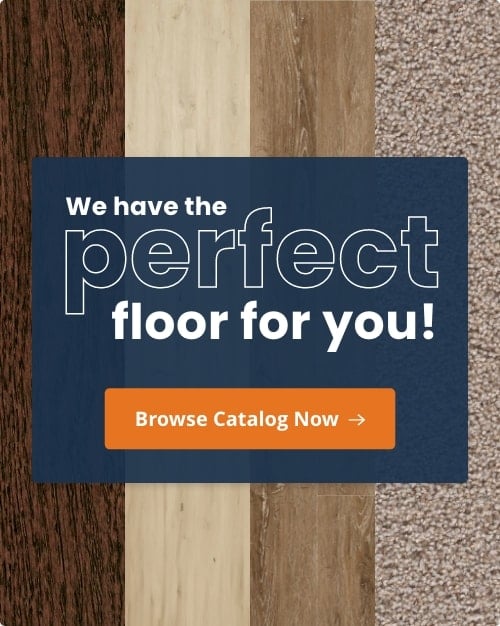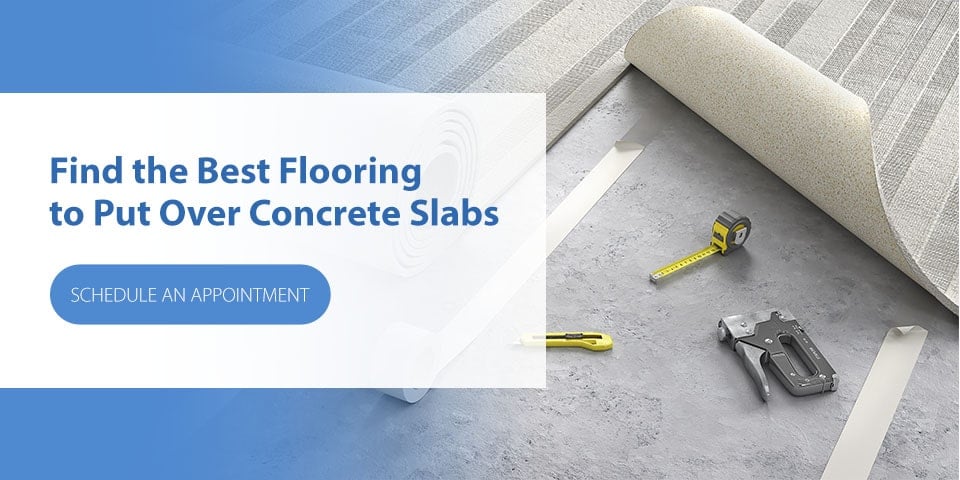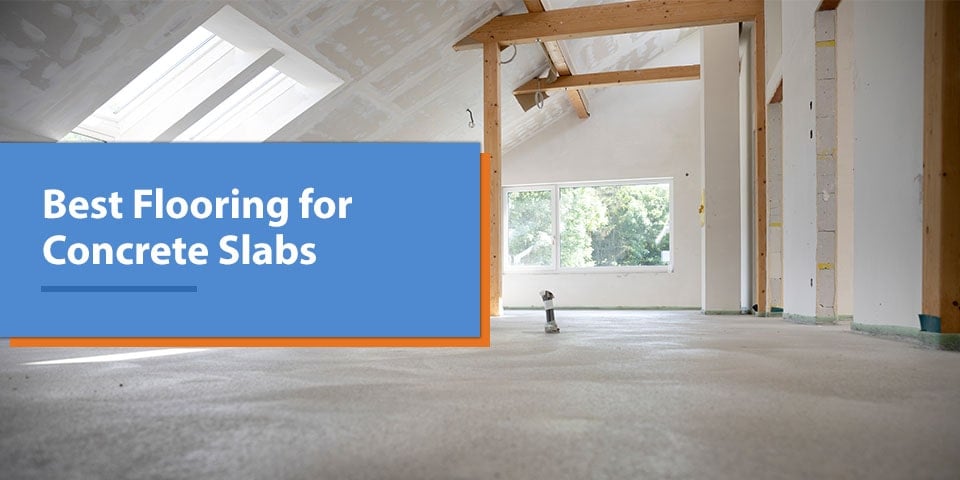

Engineered Wood | Vinyl | Laminate | Carpet | Tile
When choosing between flooring types, most people consider what colors, styles, and materials fit their home’s style. However, an important factor you might forget is the surface upon which you’ll install your flooring. This foundational layer, or substrate, performs several crucial functions, like distributing weight and supporting your floor. Common substrates include plywood or concrete slabs. If your home has a basement, that level likely has a concrete slab as its substrate.
A concrete slab provides a strong foundation for your home and is a low-maintenance way to keep moisture and other outside factors, like insects, out of your basement. However, if you plan to finish your basement or install flooring in another room with a concrete substrate, you should be aware of the unique traits that can affect your flooring. Check out this guide to selecting flooring for concrete slabs that will enhance your basement’s design while functioning well with your substrate.
Rooms You Might Find With Flooring Over Concrete
It’s common to find concrete substrate layers in the lower levels of homes. Concrete slabs are known for their durability, so these surfaces are usually found in basements or areas with frequent temperature changes. As concrete is an effective and long-lasting substrate, you may be surprised to see just how many rooms in your home have concrete slabs underneath your current flooring.
Basement
Some homeowners choose not to finish their basements and instead explore concrete flooring options like paint to make their concrete slabs feel more homey. But if you want to make a basement more inviting, in most cases you will want to install one of the various flooring options over concrete. Several beautiful options exist for flooring on concrete slabs, from carpet and wood to tile and luxury vinyl flooring.
Consider basement flooring over concrete if you have spaces for entertaining, work, or leisure activities like:
- Home bars
- Laundry rooms
- Workshops
- Creative studios
There are many options of flooring for concrete slabs, so it’s important to learn a bit about each to determine the best fit for your needs.
Bathroom
Similar to basements, bathrooms deal with a lot of moisture and temperature changes. While the flooring you choose to go on top of your concrete needs to withstand water and humidity, so does your subfloor.
Luckily, concrete slabs are highly durable and capable of handling moisture, which keeps your top flooring looking beautiful. You can even use concrete flooring on second floors with the proper structural beams and elements in place.
Kitchen
Your kitchen is also more likely to see spills and staining than other rooms in your home. Concrete slabs are a good base for water-resistant top flooring. You can easily lay your desired flooring down on a smooth and level concrete foundation for a more polished look.
Additionally, some homeowners enjoy an industrial look for their kitchens and choose to seal the concrete to use as their finished flooring.
Living Room
If other areas of your home have concrete base flooring, it’s likely your living room will also. Especially if your home doesn’t include a basement, ground floors benefit from concrete slabs.
A concrete foundation creates an effective barrier between your home and burrowing insects and moisture. While concrete flooring doesn’t provide the most inviting atmosphere for a living room, it does supply a solid, protective base for cozier flooring options like carpet or hardwood.
Concern Areas for Concrete Slabs
Understanding the challenges of a concrete subfloor can help you select a compatible, long-lasting flooring option.
Moisture Substrate
The first element to consider is moisture. While concrete slabs help create a barrier between your home and outside moisture, they’re not impenetrable. Though it appears solid, concrete is a permeable material that can absorb and release moisture.
Water may enter your concrete slab due to high humidity or ground moisture. This is especially true if your basement is prone to floods or leaks during heavy rainfall. When a concrete slab absorbs moisture, it can retain it for a surprisingly long time.
Installing the wrong flooring over consistently damp concrete may cause warping and wear over time. Fortunately, a variety of flooring materials are water-resistant enough to function well over a concrete slab. Paired with additional protective measures such as waterproofing membranes or barriers, these resilient flooring types can ensure a long-lasting floor covering for a concrete slab.
Flatness
If your concrete slab isn’t perfectly flat, some flooring types may accentuate that unevenness and cause problems. Even slight variations in grade can be exaggerated after flooring installation. To help guide your flooring selection process, check if your concrete slab is level. If you notice uneven areas, it may be wise to consider more forgiving flooring like carpet or luxury vinyl.
Schedule Your In-Home Consultation
Best Flooring for Slab Foundation
With moisture and unevenness concerns in mind, you can select a flooring that will fit both your concrete slab and your design goals. Other important considerations include the location of your slab, the amount of water it receives, and your flooring preferences.
The following are some well-suited flooring options to explore:
1. Engineered Wood
Natural hardwood flooring is a classic option, offering undeniable charm, elegance, and durability. However, engineered wood can give you a similar look and is better equipped to handle moisture, making it a better choice for a concrete slab covering.
Engineered wood owes its water resistance to its unique structure. Each engineered board consists of thin strips of durable wood compressed onto high-grade plywood. These layers enable the wood to remain rigid and resist contraction and expansion from moisture.
Offering the charm of natural wood with greater durability, engineered wood can transform any room with concrete flooring into an impressive, inviting space for entertaining or relaxing. Engineered wood is also more affordable than other flooring options.
Pros of Engineered Wood
Engineered wood gives homeowners the flexibility to place wood over concrete. These materials endure in areas with high moisture and fluctuating temperatures, saving you money. Additionally, engineered wood is available in various thicknesses.
Choosing a thicker material can prolong your investment’s life, and you can refinish select styles for a new look. Pick from numerous low-maintenance engineered wood color and finish options for spaces with heavy foot traffic.
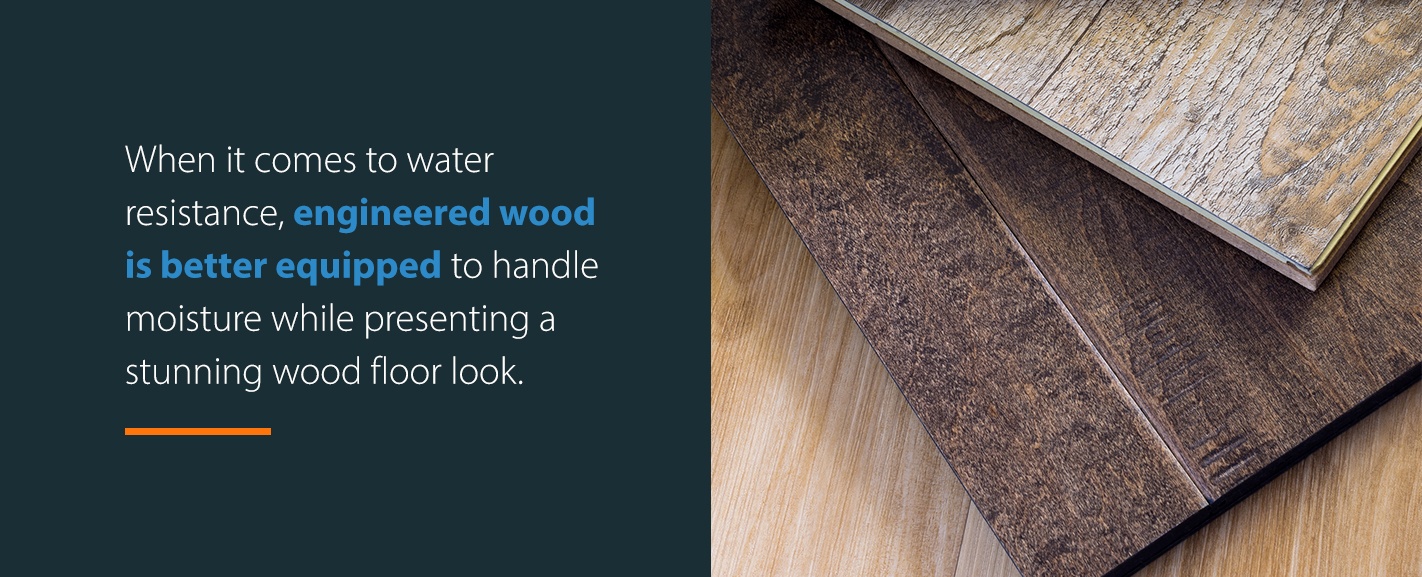

2. Luxury Vinyl
As a longstanding favorite for kitchens and bathrooms, luxury vinyl is known to be highly water resistant. Like engineered wood, luxury vinyl harnesses the power of layers to increase its durability. This includes backing, top design, and protective layers.
Several types of luxury vinyl flooring may work better for different concrete floors:
- Luxury vinyl tile or planks: Luxury vinyl emulates the look of hardwood or tile with increased moisture resistance. Because this vinyl type comes in planks or tiles, there is potential for tiny gaps that may allow moisture to seep into the concrete substrate. If moisture is less of an issue for your concrete slab, you may consider luxury vinyl tile (LVT) or planks.
In addition to its affordability, luxury vinyl flooring offers temperature benefits for basement installation. Many basement subfloors are concrete slabs that are cold underfoot, especially during the winter. Luxury vinyl won’t transfer the cold from the concrete, which will create durable and comfortable basement flooring.
Pros of Luxury Vinyl Flooring
Installing luxury vinyl over concrete lets you replicate a natural wood or stone look with a much lower price tag. This flooring material comes in numerous sizes, perfect for large and small rooms. Installation professionals can cut luxury vinyl with a special knife to account for walls and edges. When installing this flooring over concrete, you can forget about routine waxing and polishing. Get durable flooring materials for basements known to last upward of 20 years.
3. Laminate
Laminate is made of synthetic composites that are layered for maximum durability. These layers include:
- A back layer for stability and moisture resistance.
- A fiberboard core layer for impact resistance, stabilit, and durability.
- A decorative layer that gives the composite material the appearance of wood, tile, ceramic, or other materials.
- A wear layer that serves as a clear, protective finish to prevent scratching, chipping, and denting, as well as fight moisture, staining, and fading.


Like other effective flooring for concrete slabs, laminate uses layers to fight moisture. You may also wish to install additional protective measures such as vapor barriers or padding for optimal performance. In most cases, the layered structure of laminate makes it a reliable option to install over your concrete slab. If you plan to transform your basement into a high-traffic area for entertaining and relaxing, laminate could be a great option.
Pros of Laminate Flooring
Laminate materials mimic the appearance of natural wood, stone, and ceramic, with high-quality images printed on the flooring’s top layers. Since laminates are made from composite materials, you can feel good knowing zero trees were involved in their creation.
Homeowners often choose laminate flooring for concrete substrates because the materials float, so they can hide uneven surfaces or imperfections in the slab. Because these images are scratch- and scuff-resistant, upkeep is also easy—just vacuum or mop to keep laminate clean.
4. Carpet
Carpeting has many benefits for a basement. In an area that likely doesn’t have windows or natural light, carpet can add much-needed color. It can also be a kid-friendly flooring if you want your basement to function as a playroom.
Because carpet is made from material fibers, it is highly absorbent. Although it may help soak up excess moisture in the event of a leak, if your basement is prone to frequent flooding, you may want to opt for a more waterproof flooring method.
For the best performance over a concrete slab, select a low-pile carpet made from synthetic fibers. This carpet build won’t absorb as much water but will still provide a soft and stylish addition to your basement.
Pros of Carpeting
Carpet installations keep you warm in spaces with concrete floors and without natural light. Stay cozy during the winter months without running your heating system excessively. What’s more, carpets make your basement feel welcoming with unique colors, textures, and designs.
Homeowners also appreciate carpet’s noise-dampening qualities. Basement carpet over concrete flooring helps to reduce noise from downstairs televisions, sound systems, and other devices.
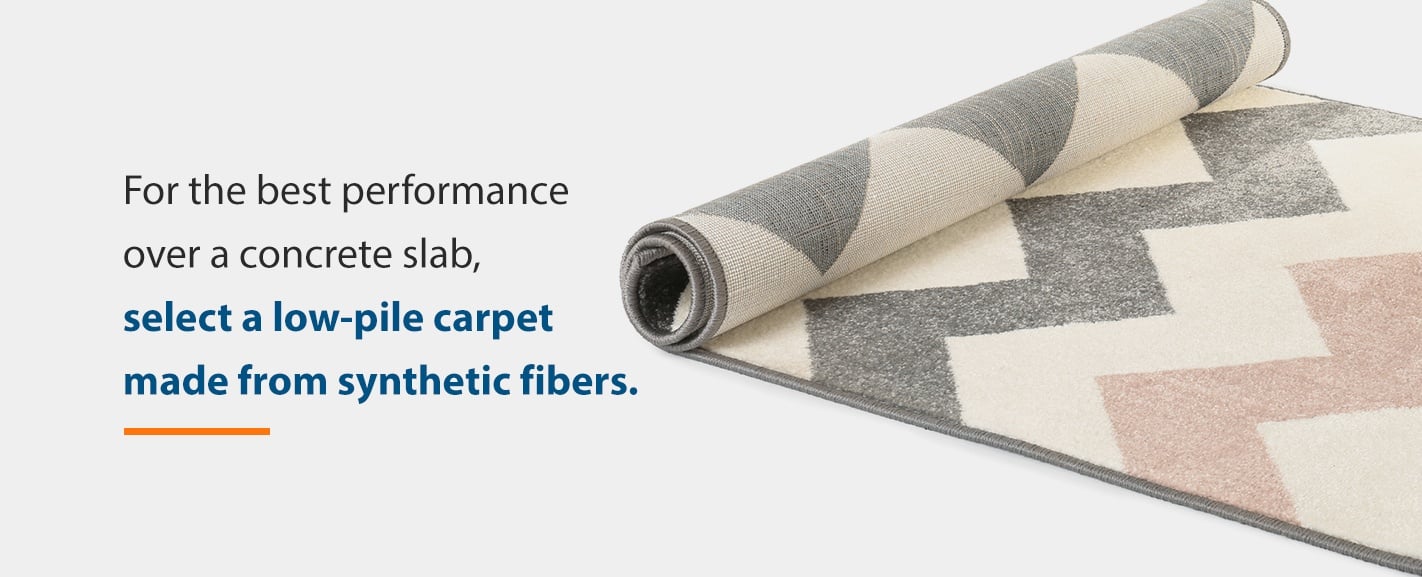

5. Tile
LVT has overtaken the industry as the primary choice for new tile installations among today’s homeowners. Technological advances allow luxury vinyl to outperform porcelain and ceramic at nearly every level, even when installed over concrete slabs.
This flooring consists of four layers, each responsible for a unique function that enhances your floor’s overall performance. The image layer contains the surface’s color or pattern, and the wear layer sits on top to protect it. The core adds rigidity and strength, while the backing offers cushioning.
Because it is water-resistant, it’s common to see LVT in bathrooms and other areas where moisture is prevalent. With various color and pattern options, luxury vinyl tile can add style, comfort, and durability to your concrete slab.
Pros of Luxury Vinyl Tile Flooring
Luxury vinyl’s ability to replicate wood, stone, and ceramic allows you to achieve a natural look at a significantly lower price. Despite its cost-effectiveness, it still offers many advantages. Because of its technologically advanced construction, LVT is highly durable. Installing luxury vinyl flooring over concrete is quick and easy, as is cleaning it. Since it won’t scratch, dent easily, or warp over time, it can withstand years of everyday use.


What Flooring Should You Choose to Lay Over Concrete?
When choosing what flooring is best for concrete slabs, you’ll need to consider the location of the floor, the current condition of the concrete, and your budget.
Choosing Quality Flooring for Basements
The location of the floor you plan to upgrade can affect which flooring options are suitable. The best flooring for basements is different than the best flooring for upper levels. Basements present moisture issues, so it’s important to pick a waterproof flooring material.
All-weather carpet and luxury vinyl flooring are some of the best choices of flooring for slab substrates.
Choosing the Best Flooring for Poor Slab Foundation
The condition of your concrete foundation may also guide your flooring decision.
If you have cracked or uneven concrete subflooring, you’ll want to choose flooring that maintains its shape under stress and hides any issues with your concrete. In this case, the best flooring to put over concrete is either luxury vinyl flooring or laminate with the addition of a thick underlayment.
Choosing Affordable Flooring
Of course, some flooring options are more expensive than others. Typically, with a higher price tag comes a longer product lifetime. If you’re working within a certain budget, your flooring options will be narrower, which can actually help focus your search for the right flooring for concrete slabs.
Price can vary by flooring provider and by the size of your job, but in general, the most to least expensive flooring materials include:
- Engineered or solid hardwood
- Carpet
- Laminate
- Luxury vinyl
While the quality and functionality of your flooring should be the main focus, it’s important to remember the price, as well.
Best Flooring to Put Over Concrete
A new floor can completely transform a space, making it into a warm and inviting area you and your family will love. When you’re looking for flooring options to cover concrete slabs, trust the professionals at 50Floor to guide you to the perfect product.
With our free in-home consultations, one of our knowledgeable employees will come to you so you can see flooring samples in your lighting. Our flooring consultants will help you make an informed decision about what moisture resistance your foundation needs. For quality professional service and the expertise to install the best flooring for concrete in your home, schedule a consultation appointment today!

